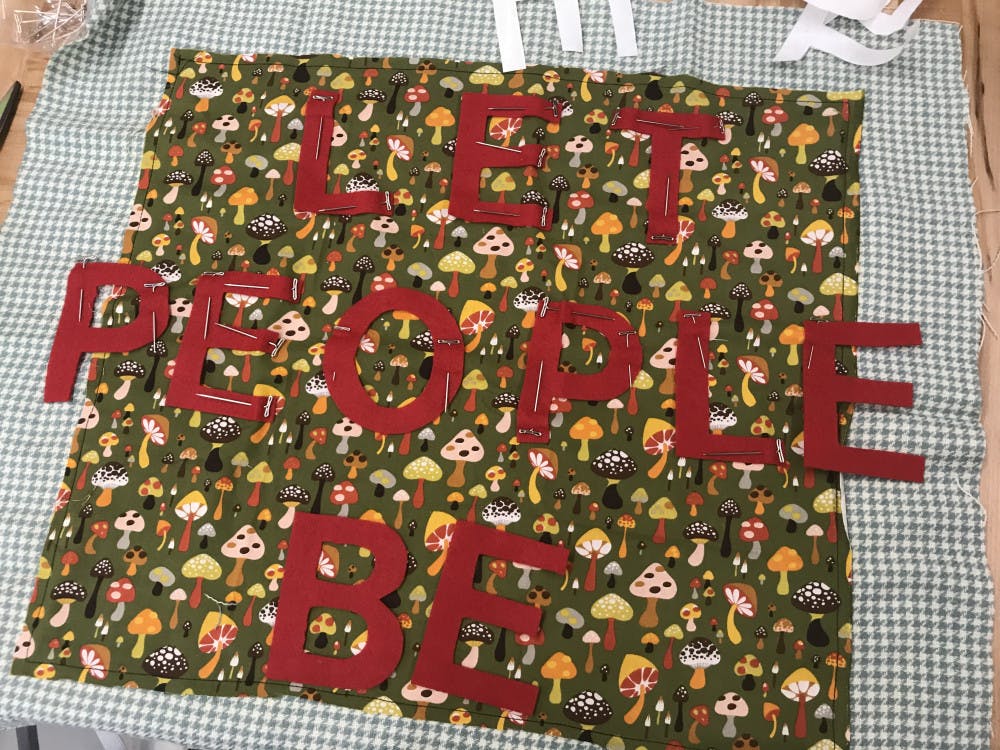Tick, tick, tick, went the sound of a sewing machine in a small room filled with tables covered with scattered, patterned multicolored fabrics, pins, stencils and felt letters.
Professors and students came together to create fabric messages for the world.
These messages were in the form of protest banners composed of felt letters on fabric, courtesy of artist Aram Han Sifuentes’ political activism and inspiration.
Sifuentes led a workshop for UF art students and professors to make protest banners out of fabric on Tuesday at Norman Hall.
This workshop emulates Sifuentes’ artistic activism. She started creating protest banners out of fabric with her friends, family and neighbors who wanted to protest in the streets, but feared that their identity would put them in danger.
“It felt so important for us to make them even though we can’t physically use them,” Sifuentes said. “I thought about turning the project into a lending library.”
Sifuentes said as the 2016 U.S. presidential election approached, more people asked to make or borrow banners, which inspired her to start a “library” from her home.
Sifuentes’ inspiration stemmed from her time spent sewing with her parents, who run a dry-cleaning store in Central Valley, California, after they all immigrated from South Korea.
“My parents came here without knowing what they’d do for work,” Sifuentes said. “Luckily someone in the small Korean community of Central Valley hired them to work at their dry-cleaning business.”
Her father started working with the machines, cleaning and pressing clothes while her mother hemmed and sewed.
Sifuentes wants to create artwork that helps marginalized communities and immigrants, she said at her talk at UF on Monday.
“Sewing became political for me and linked to my identity,” she said.
Sifuentes’ work has consisted of protest banners, curtains reading citizens their rights and sewn U.S. citizenship test samplers, which show the 100 potential questions and answers to the test.
“When I started this, I wasn’t a citizen, so I had to learn the test material,” she said. “So I did that through sewing.”
Sifuentes said she matched the cost of each sampler she sewed to the total cost of applying for U.S. citizenship: $725. She wasn’t going to apply for citizenship unless she sold a sampler.
“I wasn’t going to sell it until I was done,” she said. “And then Trump happened.”
Aml Altwayjri, a UF 26-year-old art education graduate student, said that although the artist talk was a requirement for one of her classes, she would’ve attended anyway because as someone who is from Saudi Arabia, she’s interested in the multicultural arts.
“I see how life is different here,” Altwayjri said. “I’m an immigrant, but I can feel what they feel. Not everyone is good at writing or saying what they feel,” she said. “By doing art, many people can express themselves.”
The goal of the workshop, which Sifuentes has led at other colleges, was to get people to use art to make their voices heard in activism, she said.
Students and professors created banners that read messages such as “Let people be,” “Impeach the f***er” and “Save art save the planet.”
Marina Sachs, a UF 25-year-old Masters of Fine Arts in photography graduate student, said she attended the workshop because she wanted to make a banner for her and her partner, who is not a citizen.
“My initial thought is this would be used if we were to ever get our marriage license,” Sachs said. “Potentially, our queerness and her status as a noncitizen could affect the ability for us to get married or to get a green card for her.”
Sachs sat on the floor of the hallway and arranged lime green felt letters across a glimmering orange sheet of fabric to read, “Our love is undocumented.” The letters symbolize her partner one day getting a green card, she said.
“It also speaks to her being a noncitizen, but also for me and her having to hide to certain people that we’re together,” she said. “I never thought I’d be in this position of having to stay silent on someone and something I love and care for so much.”
Correction: The article originally incorrectly reported a student's major. It has been updated. In addition, a quote has been updated to better reflect what the person said.



